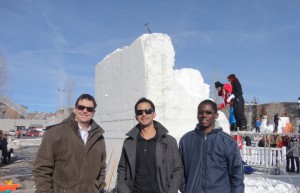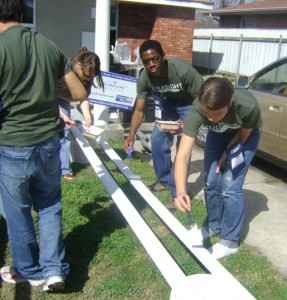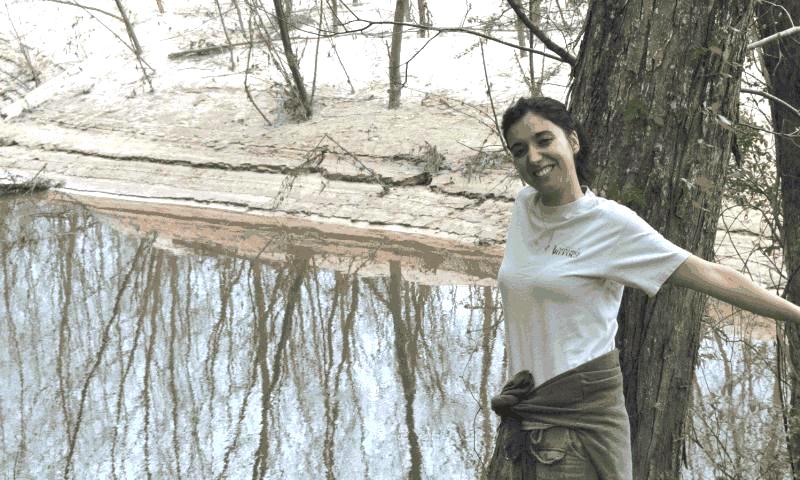
Dr. Jack Stapleton (left), Dr. Nirjal Bhattarai (center) and Ernest Chivero, 2010-2013, Zimbabwe (right) at the 2014 Budweiser International Snow Sculpture Championships
I came to the United States on an International Fulbright Science & Technology Award to pursue a Ph.D. in Molecular and Cellular Biology at the University of Iowa (Iowa) in 2010. Following a welcome reception hosted by the Iowa Chapter of the Fulbright Association and the University of Iowa International Programs office, an Iowan said, “Welcome to Iowa, we have both culture and agriculture!” My time as a Fulbrighter has indeed been a great cultural and academic experience – including getting to know the famous Iowa cornfields!
My academic experience at Iowa has been exceedingly fruitful and exciting. I have been studying how viruses interact with the immune system at the molecular level, and how findings can be translated into new, improved immune-based therapies. I have always wondered what happens when two pathogens infect the same host at the same time. I imagine it’s a fierce territorial battle! Our body is one such host in cases of HIV, GB virus C, Hepatitis C virus, or Tuberculosis co-infections. Dr. Jack Stapleton’s laboratory at Iowa has given me an opportunity to study why HIV-infected people co-infected with GB virus C survive longer than people who are only HIV-infected. To better understand GBV-C’s protective effects in HIV-infected people, I characterize immune cells targeted by GBV-C for infection and how their activation pathways and functions are affected. Our lab and others have shown that GBV-C infection reduces the activation of immune cells and I believe that understanding the mechanisms of GBV-C modulation of immune cell activation may lead to novel ways to treat HIV-induced immune activation and inflammation.
My Fulbright research integrates cell biology, virology and immunology at the molecular level. Consequently, I have acquired new skills in the biomedical sciences including tissue culture, nucleic acid techniques, and flow cytometry. In addition, I have improved my scientific writing and presentation skills.
As part of the International Fulbright Science & Technology Award, I have had the opportunity to travel and attend international symposia including the Keystone Symposia on Molecular and Cellular Biology, and Fulbright Enrichment and International Fulbright Science & Technology Seminars. So far, I have given five scientific poster presentations.
Outside of academics, being a Fulbright Student has given me opportunities to better serve and interact with others. While attending a Fulbright Enrichment Seminar in New Orleans, Louisiana, I had an opportunity to paint and rebuild houses for victims of Hurricane Katrina organized by the St. Bernard Project and their partners. It was a touching experience working as a Fulbright team helping carpenters to finish a house and provide shelter to someone in need. The need for housing using appropriate technologies for coastal areas is ongoing in New Orleans, and is part of an extensive effort to bring families back into safe homes and rebuild neighborhoods.

Ernest Chivero, 2010-2013, Zimbabwe (center) with fellow Fulbright Foreign Students at the 2013 New Orleans Fulbright Enrichment Seminar painting ceiling rails as part of a post- Hurricane Katrina house rebuilding effort with St. Bernard Project
Recently, Dr. Jack Stapleton, Dr. Nirjal Bhattarai, and I drove from Iowa City to Keystone Colorado to attend a symposium on innate immunity to viral infections. Driving through the Midwestern plains of Iowa and Nebraska to the mountains of Colorado was a unique experience. Imagine an American, a Nepali, and a Zimbabwean driving for 14 hours! What a wonderful time we had talking, laughing, and sharing our cultural experiences. During our free time at the symposium, we traveled to watch the exciting 2014 Budweiser International Snow Sculpture Championships. Previously, I was only familiar with wood and stone sculptures. What a delight it was meeting the snow artists, chiseling and molding tons of snow, and to witness the building of their amazing, innovative snow sculptures!
At the 2013 Fulbright Capstone for International Fulbright Science & Technology Fellows in Washington, DC, I was excited to make a presentation to my fellow grantees on building bridges between our countries and the United States, and how to stay connected with our home institutions and other researchers during our grant periods – and beyond. I will end this article similarly by exhorting fellow Fulbrighters to make networking an integral part of their professional development. Spend time making contacts and the benefits of increased innovation, teamwork, and success will abound.



No Comments